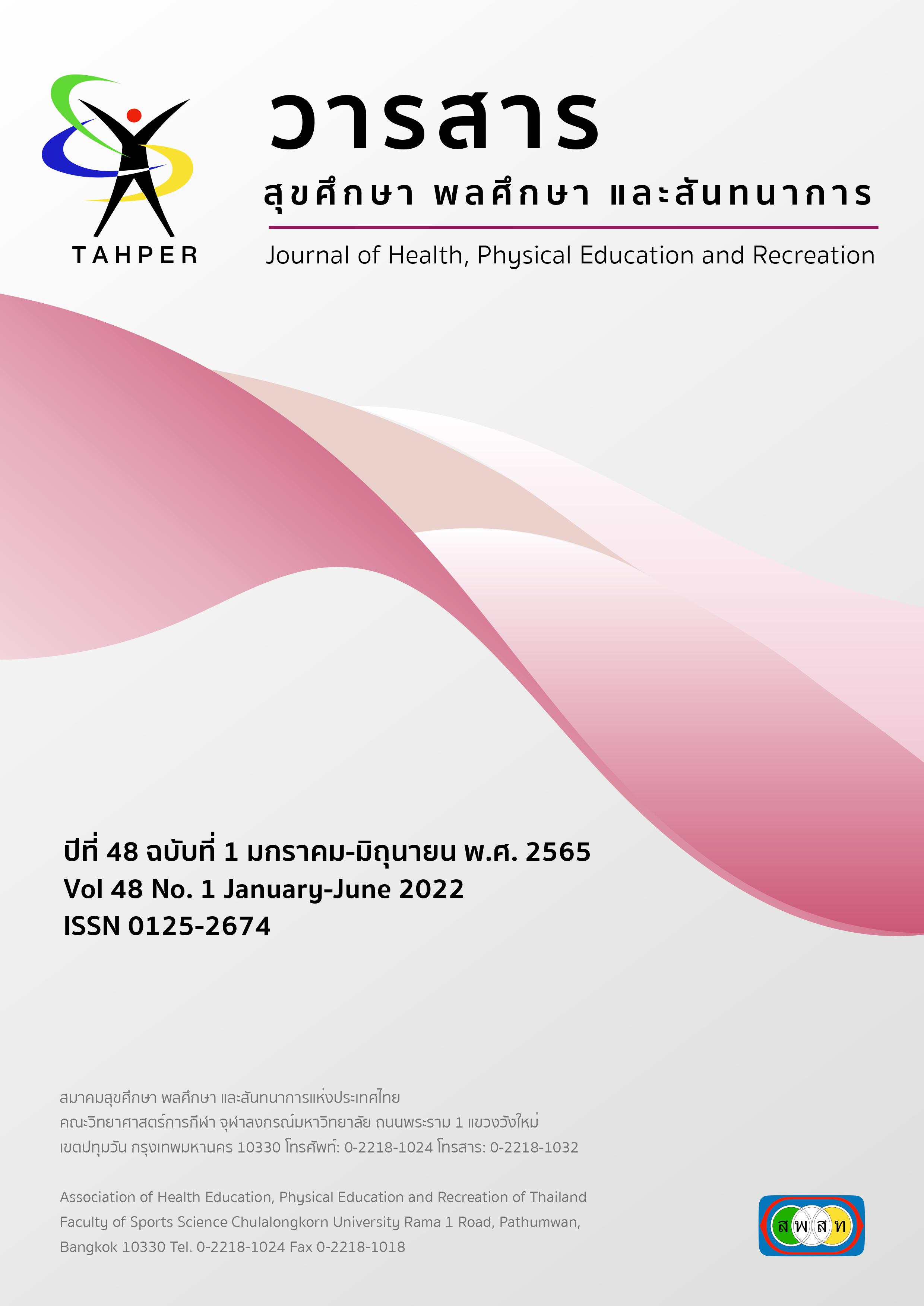การศึกษาความสัมพันธ์ระหว่างแรงจูงใจกับเป้าหมายใฝ่สัมฤทธิ์ของนักกีฬาคนพิการทีมชาติไทย The Relationship Between Motivation and Achievement Goals of Athletes with Disabilities of The Thai National Team
Main Article Content
Abstract
บทคัดย่อ
การศึกษาครั้งนี้มีวัตถุประสงค์เพื่อศึกษาความสัมพันธ์ระหว่างระดับแรงจูงใจและเป้าหมายใฝ่สัมฤทธิ์ที่มุ่งในการกระทำหรืองาน (Task) และลักษณะเป้าหมายใฝ่สัมฤทธิ์ที่มุ่งเปรียบเทียบผู้อื่น (Ego) ในของนักกีฬาคนพิการทีมชาติไทย กลุ่มประชากรที่ทำการศึกษาครั้งนี้เป็นนักกีฬาคนพิการเพศชายและหญิงทีมชาติไทย อายุ 18 ปีขึ้น ได้รับการคัดเลือกเข้าแข่งขันกีฬาพาราลิมปิกเกมส์ครั้งที่ 16 ประจำปี 2563 จำนวน 65 คน เครื่องมือที่ใช้ในการวิจัยครั้งนี้ คือ แบบสอบถามเกี่ยวกับความสำเร็จในการเล่นกีฬา ฉบับภาษาไทย (TEOSQ) มีค่าความเชื่อมั่นของแบบสอบถามเท่ากับ .80 มีจำนวนข้อคำถามทั้งหมด 13 ข้อและแบบสอบถามแรงจูงใจในการเข้าร่วมกิจกรรมกีฬา ฉบับภาษาไทย (PMQ) มีค่าความเชื่อมั่นของแบบสอบถามอยู่ที่ .92 มีจำนวนข้อคำถามทั้งหมด 30 ข้อ
การเก็บรวบรวมข้อมูลใช้เวลาในการเก็บรวบรวมข้อมูล 4 สัปดาห์ โดยในนักกีฬาคนพิการทางการเคลื่อนไหวใช้วิธีเก็บข้อมูลโดยให้ผู้ควบคุมนักกีฬาคนพิการและผู้ช่วยวิจัยคอยช่วยเหลือผู้วิจัยและอธิบายการตอบแบบสอบถาม ผลการศึกษาพบว่า ระดับแรงจูงใจของนักกีฬาคนพิการทีมชาติไทยอยู่ในระดับมาก(แรงจูงใจภายใน x= 4.34, S.D.= .46, แรงจูงใจภายนอก x= 4.09 , S.D. = 0.55) และแรงจูงใจในการเข้าร่วมกิจกรรมกีฬากับลักษณะเป้าหมายใฝ่สัมฤทธิ์ของกลุ่ม Task ต่ำ Ego ต่ำ มีความสัมพันธ์ทางบวก ได้แก่ ด้านใฝ่สัมฤทธิ์/การยอมรับ การทำงานเป็นทีม สมรรถภาพ กิจกรรมทางสังคม การมีส่วนร่วม และด้านพัฒนาทักษะ ที่นัยสำคัญทางสถิติที่ระดับ .05 และความตื่นเต้นสนุกสนาน ที่นัยสำคัญทางสถิติที่ระดับ .01 จากการศึกษาพบว่าในนักกีฬากลุ่มนี้ จะมีพฤติกรรมที่มุ่งเรื่องการพัฒนาสมรรถภาพร่างกายด้านต่าง ๆ ให้มีความสามารถเพิ่มขึ้น และเลือกที่เข้าร่วมกิจกรรมทางสังคมมากกว่ากิจกรรมที่ต้องทำเพียงคนเดียว และจะรู้สึกมีคุณค่าในตัวเองมีเมื่อรับรู้ว่าตนเองได้มีส่วนร่วมต่อกิจกรรมนั้น ๆ และในนักกีฬา กลุ่ม Task สูง Ego ต่ำ มีความสัมพันธ์ทางบวก ในด้านกิจกรรมทางสังคม ความตื่นเต้นสนุกสนาน การมีส่วนร่วม และด้านพัฒนาทักษะ ที่นัยสำคัญทางสถิติที่ระดับ .05 จากการศึกษาพบว่าในนักกีฬากลุ่มนี้ จะมีลักษณะที่มุ่งเน้นเรื่องของการพัฒนาทักษะทางการเล่นกีฬาเป็นหลักงาน มักจะมีความสุขในการฝึกซ้อม เพราะไม่มีการเปรียบเทียบกับความสามารถของผู้อื่น
คำสำคัญ : แรงจูงใจ เป้าหมายใฝ่สัมฤทธิ์ นักกีฬาคนพิการทีมชาติไทย
Abstract
The purpose of this study was to describe the relationship between motivation levels and achievement goals of the Thai national team of disabled athletes. The population in this study consisted of 65 male and female disabled athletes from the Thai National Team aged more than 18 years and all of them were selected to compete in the 16th Paralympic Games 2020 competition. The instrument used in this research was a Thai version of Task and Ego Orientation Sport Questionnaire (TEOSQ), which the confidence value of the questionnaire was .80 with a total of 13 questions and the Thai version of Participation Motivation Questionnaire (PMQ), Which the confidence value of the questionnaire was .92 with a total of 30 questions.
The data was detained in 4 weeks. In athletes with mobility disabilities, data collection methods were used a coach and a research assistant to assist to the investigator and explain the questionnaire responses. The results showed that the level of motivation of athletes with disabilities in the Thai National Team was at a high level (intrinsic motivation, x = 4.34, S.D. = .46; extrinsic motivation, x = 4.09, S.D. = 0.55). The motivation for participating in sports activities and the achievement goal characteristics of the low-task, low-ego group had a positive correlation, e.g., achievement/acceptance aspect, teamwork, performance, social activities participation and skill development at the statistical significance of .05 and the excitement at statistical significance at the .01 level. The study found that in this group of athletes their behaviors were focus on the development of physical fitness in various of social activities more than doing activities alone, and in athletes. In the high-task, low-ego group was a positive correlation, in social activities rather than activities that must be done alone. They felt self-worth when they perceived that they participated in in social activities with fun, excitement participation and skill development at a statistically significant level of .05, so in this group of athletes focused on the development of sports skills as the main gold with happiness practice because there is not compare to the others.
Keywords: Motivation, Achievement Goal, Athletes with Disabilities of The Thai National Team.
Article Details

This work is licensed under a Creative Commons Attribution-NonCommercial-NoDerivatives 4.0 International License.
Critical thinking in journals is the right of the author. The Association of Health Education, Physical Education and Recreation of Thailand is not always required, to create diversity in ideas and creativity.
ความคิด ข้อวิพากษ์ในวารสารเป้นสิทธิของผู้เขียน สมาคมสุขศึกษา พลศึกษา และสันทนาการแห่งประเทศไทยไม่จำเป็นต้องเห็นชอบด้วยเสมอไป เพื่อให้เกิดความหลากหลายในความคิดและความสร้างสรรค์


